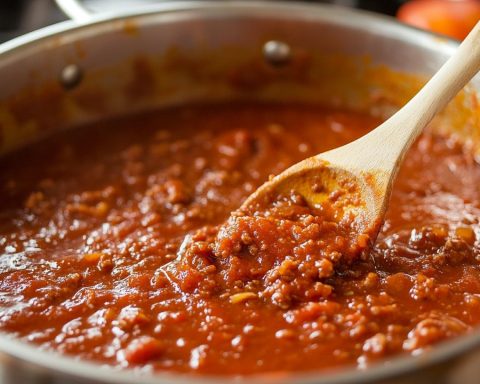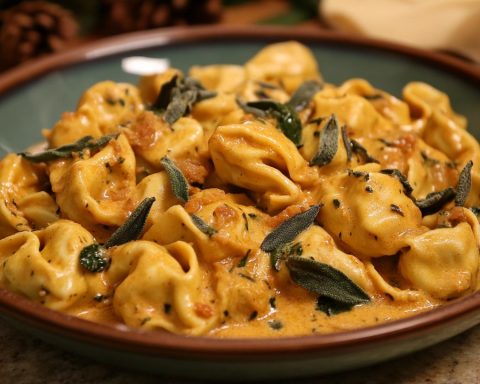In the heart of Brazil, nestled among the vibrant hues of the rainforest and the rhythmic pulse of samba, grows a little-known fruit with a dark, glossy skin that clings tightly to its tree’s trunk. This fruit, the jaboticaba, is a hidden gem cherished by locals for its tart-sweet burst of flavor and a hint of mystique. Resembling a cluster of deep purple pearls, jaboticabas are more than just a delight for the senses; they are packed with antioxidants and renowned for their health benefits. Confiture jaboticaba, a luxurious Brazilian jam, captures this unique flavor, offering a taste of Brazil’s rich biodiversity. Whether it’s spread on a warm, buttery croissant at breakfast, served with creamy cheeses on a charcuterie board, or simply enjoyed by the spoonful, this confiture is a culinary experience not to be missed.
Ingredients:
– 1 kg of fresh jaboticaba fruits
– 500 g of granulated sugar
– Juice of 1 lemon
– Zest of 1 lemon
– 1 cinnamon stick (optional)
– A small piece of fresh ginger (optional), peeled and sliced
Instructions:
1. Prepare the Jaboticaba Fruits:
Begin by washing the jaboticabas thoroughly under cool running water to rid them of any impurities. Once cleaned, prick each fruit with a fork or cut a small slit with a knife. This step is crucial as it allows the juices to seep out while cooking, enhancing the flavor of the confiture.
2. Maceration Process:
In a large bowl, combine the prepared jaboticabas, sugar, lemon juice, and lemon zest. Stir gently to ensure that the sugar begins to dissolve and coats the fruits evenly. Allow the mixture to sit for at least 2 hours, or ideally overnight in the refrigerator. This maceration process will draw out the juices, resulting in a more robust flavor and smoother texture for your confiture.
3. Cooking the Confiture:
Transfer the macerated mixture to a heavy-bottomed pot or Dutch oven. Add in the cinnamon stick and ginger for an additional layer of warmth and spice. Set the pot over medium heat, bringing the mixture to a gentle boil. Stir intermittently to avoid sticking and burning.
4. Simmer to Perfection:
Once boiling, reduce the heat to a simmer and allow the confiture to cook for about 45-60 minutes. Stir occasionally, crushing the jaboticabas with the back of a wooden spoon to release their full essence. The jam will begin to thicken as it reduces. To test for doneness, place a small droplet on a cold plate; if it wrinkles when pushed, it’s ready.
5. Finishing Touches:
Remove the cinnamon stick and ginger slices from the pot, discarding them. You can opt to leave the fruit whole for a rustic texture or blend the mixture for a smoother consistency, depending on your preference.
6. Preserve the Magic:
While still hot, ladle the confiture into sterilized jars, leaving a small gap at the top. Seal the jars with their lids and let them cool to room temperature. Store in a cool, dark place where the confiture can rest and develop its flavors further.
Cooking Tips:
– Make sure your jars are well sterilized to prolong the shelf life of your confiture.
– For an added depth of flavor, consider adding a splash of vanilla extract or a pinch of star anise during the simmering process.
Serving Suggestions and Pairings:
– Spread your confiture jaboticaba over warm toast or croissants for a decadent breakfast treat.
– Pair it with creamy, soft cheeses like Brie or Camembert to create a harmonious balance of flavors for a sophisticated appetizer.
– Incorporate it as a topping for pancakes or waffles, enhancing your brunch with a burst of Brazilian flair.
Jaboticaba Jam: Brazil’s Secret Culinary Delight Unveiled
<Brazil's Jaboticaba, a small yet striking fruit, is making waves beyond its native country, captivating culinary enthusiasts with its unique appeal. But what makes this glossy fruit so intriguing?
Are Jaboticabas More Than Just a Snack?
Absolutely. Beyond their appealing tart-sweet flavor, jaboticabas are a powerhouse of nutrition. They contain significant amounts of antioxidants, which help in reducing inflammation and improving heart health. Moreover, the skin of the jaboticaba is especially rich in anthocyanins, which are known for their potential to reduce cancer risk.
Unexpected Uses in Beauty and Medicine
In Brazil, jaboticaba is celebrated not only for its culinary applications but also for its role in traditional medicine. Its anti-inflammatory properties have been utilized in remedies for respiratory ailments and skin conditions. Furthermore, jaboticaba extracts are gaining popularity in skincare products for their potential to boost skin elasticity and reduce signs of aging.
Culinary Controversy: Is It Worth the Hype?
While the allure of jaboticaba is undeniable, some skeptics debate its worthiness as an international product, mainly due to its rapid perishability. The fruit must be consumed or processed almost immediately after harvesting, which complicates exportation. This has raised discussions about sustainability and local consumption versus global distribution.
Intriguing Queries Answered
Where can you find jaboticabas outside Brazil? They’re slowly being introduced to specialty grocery stores in North America and Europe, often found frozen or as processed products like jam or juice. As its fame spreads, will jaboticaba become a regular feature in pantries worldwide?
For more on unique Brazilian fruits and their impact on global cuisine, visit Food & Wine.








